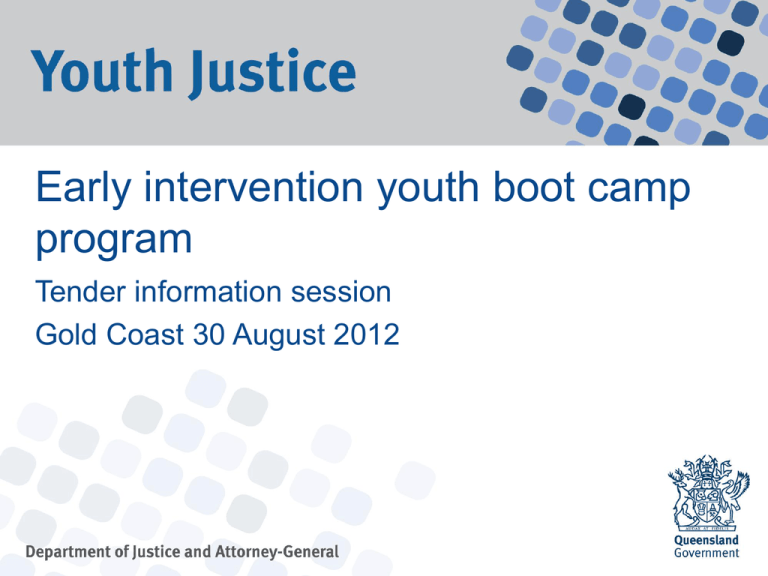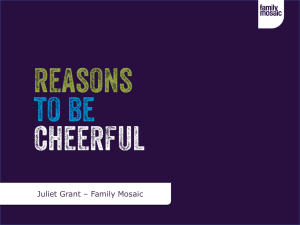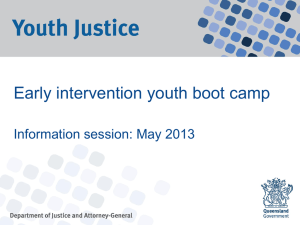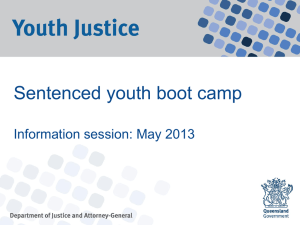Early intervention youth boot camp program
advertisement

Early intervention youth boot camp program Tender information session Gold Coast 30 August 2012 Outline of session This presentation will cover the following: • Background • Program objectives • Target group • Referral pathway • Features of service delivery • Service delivery responsibilities • Requirements for funding eligibility • Key budget areas • Key dates/milestones Background • The Queensland Government made an election commitment as part of its Safer Streets Crime Action Plan to trial boot camps for young people. Program development • review of international literature • Ministerial Round Table • written submissions • meetings with existing boot camp service providers. Background Key messages from literature Research has demonstrated that youth boot camps will be most effective if they: • provide structure, discipline and physical activity • allow for personal development and self-esteem building through physical activities • address the causes of crime • provide ongoing support to young people after they return to the community. Background Key messages of consultation • responsive to needs of young people • underpinned by integrated case management framework • involve aftercare and mentoring • involve family members • be evidence-based • reflect the specific needs to Aboriginal and Torres Strait Islander young people… Background Key messages of consultation continued… • limit time young people are removed from the community • target young people before they become entrenched in the criminal justice system • respond to the specific needs of females • exclude young people who may place participants at risk • be evaluated. Background Two youth boot camp models developed: • Early Intervention Youth Boot Camp (EIYBC) • Two year trial at Gold Coast involving 40 participants • Targeting young people before they are entrenched in the criminal justice system. • Sentenced Youth Boot Camp (SYBC) • Two year trial at Cairns involving 40 participants • Targeting young people facing a detention sentence. EIYBC objectives/ outcomes • • • • • • • • develop the consequential thinking increase participation in school/employment improve health and well-being enhance ability to operate in routine and disciplined environments (such as school) develop family functioning increase self-confidence develop personal and inter-personal skills reduce likelihood of involvement in criminal activity. EIYBC target group • Young people aged 13–17 years who are at high risk of entry to and having long term involvement in the criminal justice system. • Three or more of the following risk factors must be present: • • • • • • • early family/parental conflict poor parental supervision and discipline association with peer group with anti-social attitudes early involvement with alcohol and drug use family members condoning anti-social behaviour child maltreatment recent disengagement from education, training and/or employment or at immediate risk of disengagement • anti-social behaviour. EIYBC referral pathway • Young people will participate in the EIYBC program on a voluntary basis and will not be required to admit guilt to an offence to be eligible for program referral. • Young people will be referred to the EIYBC by government and non-government agencies including: • • • • police education health child safety. • Trial target: 20 young people per year. Features of service delivery • Four EIYBC programs will be delivered each year of the trial, with 5–10 young people participating in each camp. • Family members of young people will participate in program activities at selected points-in-time. Program phases • camp • community integration. Features of service delivery Camp Two camps per program • 10 day camp (at commencement) • 5 day camp (at completion). Initial camp • Involves challenging physical activities in a safe environment. • Parents will be invited to attend on the final weekend of the camp. • The natural consequences of camp activities will provide young people and their families with insight into presenting issues. Features of service delivery • Educational/vocational, health, family support, life-skills needs of participants will be identified to inform activities taking place in the next phase. Final camp • To occur at the end of the community integration phase. • A celebration and confirmation of the new skills, knowledge, attitudes and beliefs developed by the young person and their families. Features of service delivery Community integration • Support the young person and their family within their community and continue work delivered during camp phase. • Support will be available for a period of up to three months. • Partnerships will be developed with local government and non-government providers to provide education, training and employment, health, family support and individual support services. Features of service delivery Mentoring • Mentoring will introduced in the camp phase and extend beyond the completion of the program. • Mentors will provide guidance, encouragement and support to young people through a structured and trusting relationship. • Service providers may partner with existing mentoring services or develop a volunteer mentoring network to deliver mentoring activities. Features of service delivery The program must: • be delivered with cultural competence • involve staff that are trained, supervised and hold relevant qualifications • support the participation of family members • have appropriate governance frameworks in place • collect informed consent from participants. Program delivery Funded service provider responsibilities • Assess referrals. • Deliver initial 10 day camp and follow-up 5 day camp. • Develop and coordinate case management within the camp and community integration phases. • Develop and maintain working partnerships with police, education, health, youth and family support providers. • Identify and develop voluntary mentoring network. • Contribute to the development and implement of evaluation tools. Funding eligibility requirements • The Community Services Act 2007 (the Act) governs the provision of Youth Justice grants funding. • It establishes an Approved Service Provider system designed to ensure that service providers are: • financially and organisationally viable • have the capacity, within resources, to successfully provide services consistent with the objects and guiding principles of the Act. Funding eligibility requirements • As well as holding/applying for Approved Service Provider status, all organisations making submissions must also: • have no outstanding financial accountability, service delivery or performance issues for funding previously provided by the Queensland Government • hold public liability and other relevant insurance (or provide plans to obtain insurance) • provide evidence that the organisation has the capacity to deliver and sustain the service required. Funding eligibility requirements Submissions • Must address all selection criteria and provide evidence to support each claim by the service provider and/or subcontracted service provider. • Include evidence that the organisation can meet funded output target levels. Funded outputs • Community living support: 300 places (accommodation nights) • Needs assessment/case management: 1204-1400 hrs Key budgetary considerations • Funds will be provided across a two year period. Funds are released on a quarterly basis following performance and financial acquittals from the previous quarter. • A one-off payment will be available for service establishment. • Budgets should include an itemised annual budget for each year of the trial. • Service providers will be required to create costefficiencies where possible. Performance and evaluation • Service providers will be required to report quarterly on funded outputs delivered as well as identified performance measures • A process and outcome evaluation will be undertaken to assess the trial. The funded service provider will work with the department to support this process. Key dates/milestones • Funding submissions close: 19 September 2012 • Attorney-General announcement of funded service provider: early October 2012 • Service agreement signed: 26 October 2012 • Service establishment commences: 29 October 2012 • Service delivery commences: January 2013 Further information • For tender documentation please go to www.justice.qld.gov.au • Departmental staff are available to answer further questions as they arise. Contact details are within the tender documentation. • Questions?







